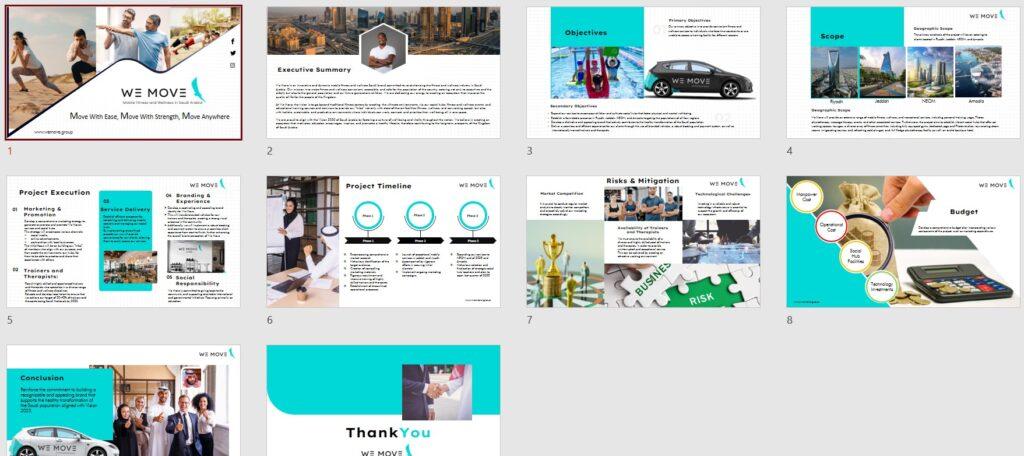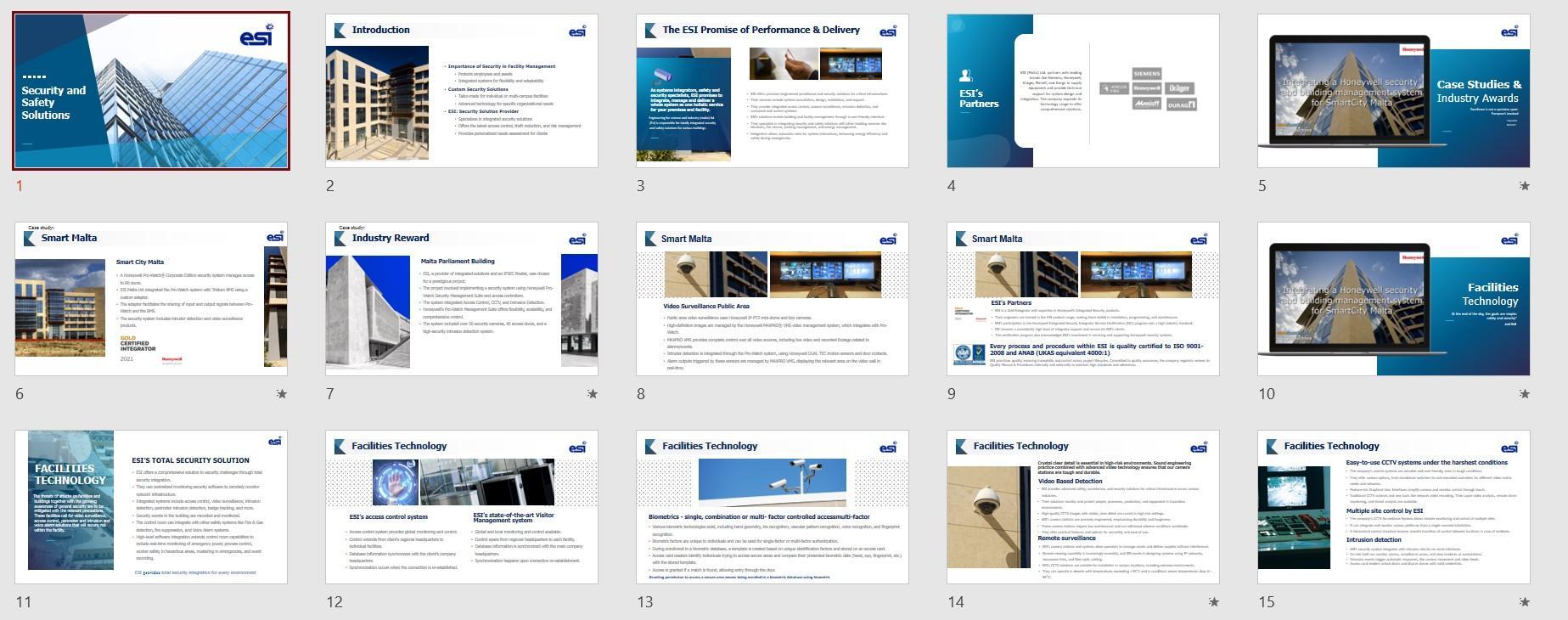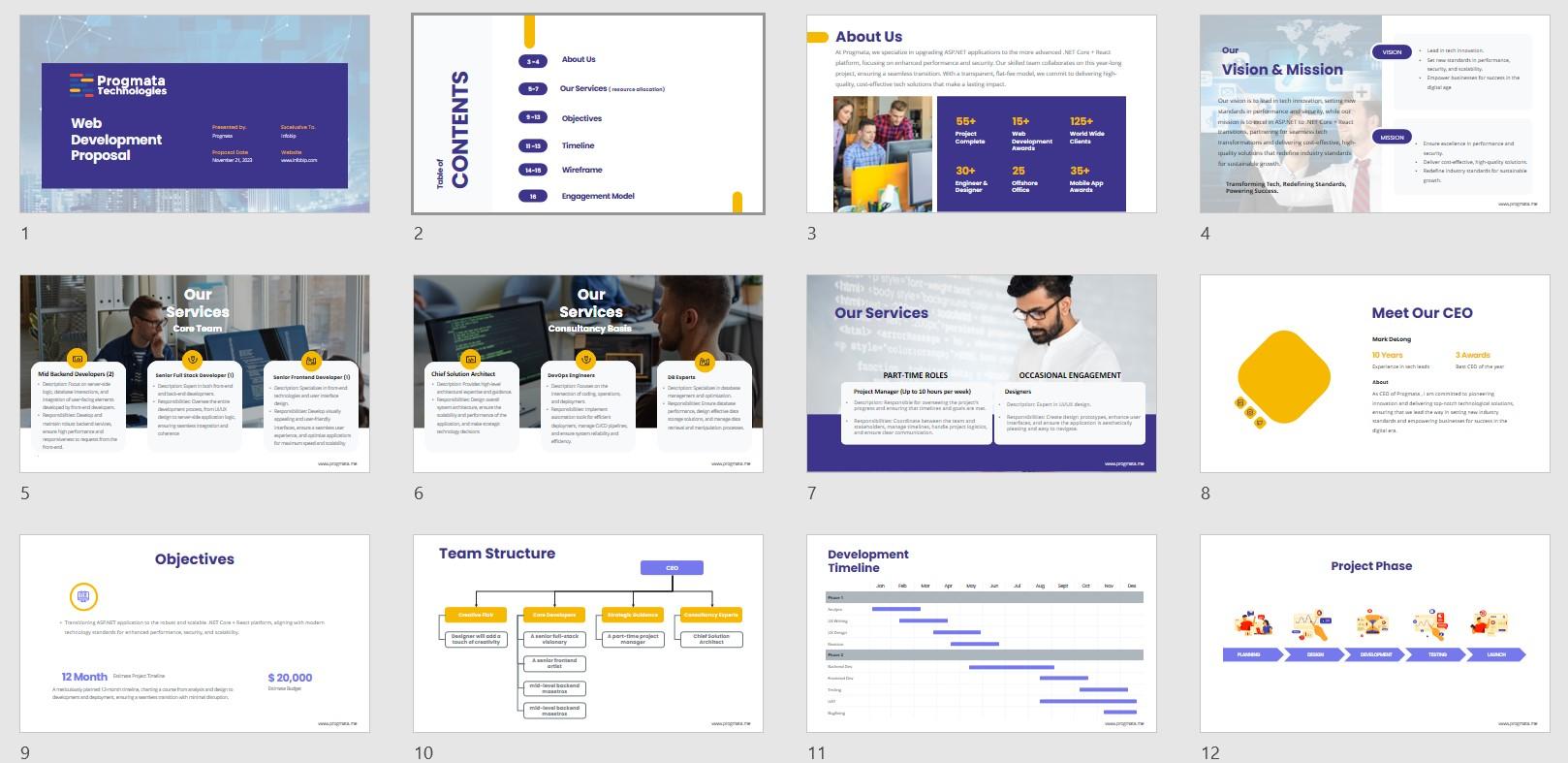Rock Your Pitch Deck Like a Pro and Win Investors
In the competitive world of startups, presenting a compelling startup pitch deck template can make or break your chances of securing funding. Whether you’re in software development, IT services, or any other tech-related field, understanding what should be included in a pitch deck is crucial for success. This blog post will guide you through creating a professional pitch deck that wows investors and sets your startup on the path to greatness.
Why a Startup Pitch Deck Matters
A pitch deck is your startup’s first impression on potential investors. It’s more than just slides—it’s a story, a vision, and a roadmap. A well-crafted pitch deck not only communicates your business idea but also shows your professionalism, dedication, and potential for growth. Let’s explore why a pitch deck matters and how it can make a difference for your startup.
The Gateway to Funding
Investors look at hundreds of pitch decks every year. Your pitch deck needs to stand out and grab their attention within the first few slides. A professional pitch deck can open doors to funding opportunities that can help turn your vision into reality.
Builds Credibility
A pitch deck showcases your business plan, market research, financial projections, and team credentials. By presenting this information clearly and compellingly, you build credibility and gain the trust of potential investors.
Clarifies Your Vision
Creating a pitch deck forces you to distill your business idea into a concise format. This process helps clarify your vision and strategy, ensuring that you and your team are aligned and focused on your goals.
What is a Pitch Deck?
Before we dive into the specifics of what should be included in a pitch deck, let’s define what a pitch deck actually is. A pitch deck is a brief presentation, often created using PowerPoint or a similar software, that provides an overview of your business plan to potential investors. It covers key aspects such as your value proposition, market opportunity, business model, competitive analysis, financial projections, and more.
Length and Format
A typical pitch deck consists of 10 to 15 slides. Each slide should be visually appealing, concise, and informative. Avoid cluttering your slides with too much text; instead, use bullet points, images, graphs, and charts to convey your message effectively.
The Must-Have Components of a Pitch Deck
Now that we’ve covered the importance of a pitch deck and its basic definition, let’s explore the essential elements that every professional pitch deck should include.

1. Title Slide
Your title slide is the first thing investors will see, so make it count. Include your company name, logo, and a captivating tagline that summarizes your business idea.
2. Problem Statement
Clearly define the problem your startup aims to solve. Use real-world examples and data to illustrate the pain points your target audience faces. This slide sets the stage for the rest of your presentation.
3. Solution
Present your solution to the problem. Explain how your product or service addresses the pain points you’ve identified. Highlight the key features and benefits that set your solution apart from existing alternatives.
4. Market Opportunity
Showcase the market potential for your solution. Provide data on market size, growth trends, and target demographics. This slide demonstrates the scalability of your business and the potential return on investment.
5. Business Model5. Business Model
Outline your business model and revenue streams. Explain how you plan to generate income and achieve profitability. Investors need to understand how your startup will make money and sustain growth over time.
6. Competitive Analysis
Identify your main competitors and analyze their strengths and weaknesses. Highlight your unique selling points and explain how you differentiate yourself in the market. This slide shows that you’ve done your homework and are prepared to compete effectively.
7. Traction
Traction refers to the progress your startup has made so far. Include metrics such as user growth, revenue, partnerships, and customer testimonials. Traction validates your business idea and demonstrates that there is demand for your product or service.
8. Marketing and Sales Strategy
Detail your marketing and sales plans. Explain how you intend to acquire and retain customers. Include strategies for digital marketing, social media, partnerships, and other channels relevant to your industry.
9. Financial Projections
Provide a forecast of your financial performance over the next three to five years. Include projections for revenue, expenses, profit margins, and key financial metrics. Use charts and graphs to make the data easy to understand.
10. Team
Introduce your core team members and highlight their relevant experience and expertise. Investors invest in people as much as they invest in ideas, so showcasing a strong team is crucial.
11. Funding Requirements
Clearly state how much funding you are seeking and how you plan to use the funds. Break down the allocation of funds for product development, marketing, operations, and other key areas.
12. Milestones and Timeline
Outline the major milestones you’ve achieved so far and your roadmap for the future. Include a timeline that shows key activities and goals over the next 12 to 24 months.
13. Risks and Mitigation
Acknowledge potential risks and challenges your startup may face and explain how you plan to mitigate them. This slide shows that you are realistic and prepared for uncertainties.
14. Closing Slide
End your pitch deck with a strong closing slide. Include a compelling call to action, contact information, and a thank-you message. Leave investors with a positive impression and a clear next step.
Creating a Visually Appealing Pitch Deck
A pitch deck should not only be informative but also visually appealing. Here are some tips to ensure your pitch deck looks professional and engaging.
Use Consistent Branding
Maintain consistent branding throughout your pitch deck. Use your company’s colors, fonts, and logo to create a cohesive look. This reinforces your brand identity and makes your presentation more polished.
Keep It Simple
Avoid cluttering your slides with too much information. Use white space effectively and focus on key points. Simplicity enhances readability and keeps your audience engaged.
Incorporate Visuals
Use high-quality images, icons, and graphics to illustrate your points. Visuals can make complex information easier to understand and add visual interest to your presentation.
Use Data Wisely
Include charts, graphs, and infographics to present data in a visually appealing way. Ensure that your data is accurate and relevant to your message.
Practice Makes Perfect
Rehearse your pitch multiple times to ensure a smooth delivery. Familiarize yourself with the content and practice answering potential questions from investors. Confidence and preparation go a long way in making a strong impression.
Common Mistakes to Avoid
Even the best startups can stumble when creating a startup pitch deck template. Here are some common mistakes to avoid:
Overloading Slides with Text Startup Pitch deck Template
Avoid cramming too much text onto your slides. Keep your content concise and to the point. Use bullet points and short sentences to convey your message effectively.
Neglecting the Story
A startup pitch deck template should tell a compelling story. Don’t just present facts and figures; weave a narrative that captures the essence of your startup and its potential impact.
Ignoring the Audience
Tailor your pitch deck to your audience. Consider what information is most relevant to investors and address their concerns and interests directly.
Conclusion
Creating a professional pitch deck is a critical step in securing funding for your startup. By including the essential components we’ve outlined and focusing on clarity, visual appeal, and storytelling, you can craft a pitch deck that captivates investors and sets your business on the path to success.
Ready to take your pitch deck to the next level? Consider working with a pitch deck expert or a pitch deck design agency to refine your presentation and make it truly stand out. Remember, a great pitch deck is more than just slides—it’s your startup’s story, vision, and future.
Invest in your pitch deck today and unlock the doors to funding and growth for your startup.




